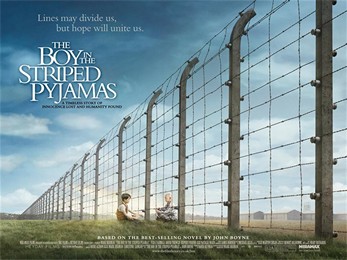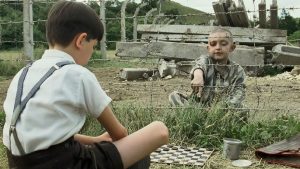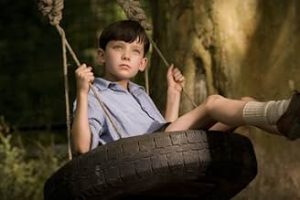The Boy in the Striped Pyjamas (2008)

Review of The Boy in the Striped Pyjamas (2008)
General Information
- Director: Mark Herman
- Main Cast:
- Asa Butterfield (Bruno)
- Jack Scanlon (Shmuel)
- Vera Farmiga (Elsa)
- David Thewlis (Ralf)
- Rupert Friend (Lt. Kurt Dussell)
- Genre: Drama, War
- Runtime: 94 minutes
- Studio: Miramax Films
Plot
The Boy in the Striped Pyjamas is a poignant and heartbreaking story set during World War II. The film follows eight-year-old Bruno (Asa Butterfield), the son of a high-ranking Nazi officer, who moves with his family from their home in Berlin to a house near a concentration camp after his father (David Thewlis) is promoted to commandant. Bruno is initially confused by the camp, which he assumes is a farm, and is told not to go near it.
One day, while exploring, Bruno meets Shmuel (Jack Scanlon), a young Jewish boy imprisoned in the camp, who is forced to wear the “striped pyjamas” of a prisoner. Despite the barbed wire and the barriers that separate them, Bruno and Shmuel form a secret friendship. The story unfolds through their growing relationship, set against the backdrop of the horrors of the Holocaust, culminating in a tragic and devastating conclusion.
Highlights
- Powerful Performances
- Asa Butterfield delivers a remarkable performance as Bruno, capturing the innocence, curiosity, and naivety of a child who doesn’t fully comprehend the world around him. His character’s innocence allows the audience to see the atrocities of the Holocaust through the eyes of someone untouched by the war’s complexities and ideologies.
- Jack Scanlon’s portrayal of Shmuel is equally touching. The bond between Bruno and Shmuel, both innocent and heart-wrenching, forms the emotional core of the film. Scanlon’s performance as a boy trapped in an unimaginable situation brings the human cost of war to the forefront, evoking empathy and sorrow.
- Thematic Depth
- The Boy in the Striped Pyjamas explores themes of innocence, prejudice, and the brutal realities of war. The contrast between Bruno’s innocent misunderstandings and the horrific reality of the Holocaust serves as a powerful commentary on the nature of evil and the impact of ideology. The film also touches on the relationships within Bruno’s family, showing how the horrors of the war seep into the personal lives of individuals, even as they may remain unaware of the full extent of the atrocities.
- The film also challenges the way children internalize ideas of hatred, particularly as Bruno’s ignorance about the concentration camp and the prisoners reveals how easily children can be molded by the world around them.
- The Impact of Innocence
- Bruno’s innocence, which protects him from fully understanding the war and its horrors, also serves as a powerful symbol. His innocent friendship with Shmuel allows the film to highlight the stark difference between the world of children and the warped reality created by the adults around them. Bruno’s curiosity and lack of understanding lead him to defy the orders of his parents, showing how innocent actions can lead to both hope and tragedy.
- Emotional Weight and Tragic Ending
- The emotional weight of the film builds slowly, with the audience becoming more aware of the tragic direction in which the story is headed. The bond between Bruno and Shmuel intensifies the impact of the film’s devastating conclusion. The ending, while heartbreaking, is essential to the film’s narrative and serves as a poignant reminder of the innocent lives destroyed during the Holocaust.

- The emotional weight of the film builds slowly, with the audience becoming more aware of the tragic direction in which the story is headed. The bond between Bruno and Shmuel intensifies the impact of the film’s devastating conclusion. The ending, while heartbreaking, is essential to the film’s narrative and serves as a poignant reminder of the innocent lives destroyed during the Holocaust.
Criticisms
- Predictable Plot
- While the emotional weight of The Boy in the Striped Pyjamas is undeniable, some viewers may find the plot predictable, especially given the historical context. The narrative’s trajectory toward its tragic conclusion is foreshadowed, and some may feel that the film doesn’t offer enough surprises in its story development. However, the film’s emotional impact is more reliant on its characters and the exploration of innocence rather than plot twists.
- Simplification of Historical Context
- Some critics have pointed out that the film simplifies the complexities of the Holocaust and the nature of Nazi concentration camps. The portrayal of the concentration camp as a mysterious “farm” may oversimplify the audience’s understanding of the historical events, especially for younger viewers. However, the film’s primary focus is on the emotional journey of the characters, rather than on providing an in-depth historical analysis.
- Limited Character Development for Adults
- The adult characters in the film, such as Bruno’s parents (played by Vera Farmiga and David Thewlis), serve their roles, but they are not as fully developed as the two young leads. Bruno’s parents are largely portrayed as products of the Nazi ideology, and while their actions are crucial to the plot, the emotional complexity of their characters could have been further explored.

- The adult characters in the film, such as Bruno’s parents (played by Vera Farmiga and David Thewlis), serve their roles, but they are not as fully developed as the two young leads. Bruno’s parents are largely portrayed as products of the Nazi ideology, and while their actions are crucial to the plot, the emotional complexity of their characters could have been further explored.
Verdict
The Boy in the Striped Pyjamas is a moving and tragic exploration of the Holocaust through the lens of childhood innocence. With powerful performances from Asa Butterfield and Jack Scanlon, the film creates an emotional narrative that highlights the stark contrast between innocence and the horrors of war. Though the plot may feel predictable at times and the historical context simplified, the film’s emotional depth and poignant storytelling make it a haunting and memorable experience. Its heartbreaking ending leaves a lasting impact, reminding viewers of the human cost of prejudice, war, and hatred.
Rating: 8/10











